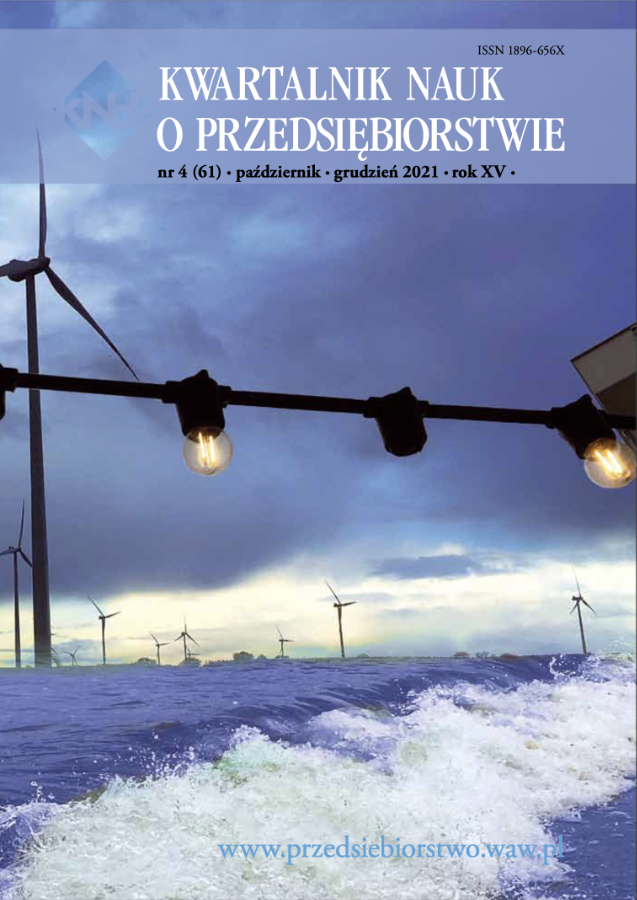The importance of public funds in financing the activities of startups in Poland compared to other European countries
Main Article Content
Abstract
The subject of research in this study is the aspect of financing the activities of startups in terms of sources of raising capital. External sources of financing from public funds available to startups were analyzed. The purpose of this study is to identify the most frequently used sources of financing for startup activities and to assess the role of available public funds compared to other existing sources. The article is based on a review of the literature on the subject. On this basis, the specificity of the functioning of startups was characterized and the available sources of financing their activities in individual stages of development were identified. The analysis of existing data from the reports of the Startup Poland Foundation and the European Startup Monitor report was also used, in terms of the importance of public funds in financing the activities of startups. The research shows that in recent years in Poland it has become more and more popular to finance startups with the use of the Polish Agency for Enterprise Development and the National Center for Research and Development. Taking into account the aspect of obtaining funding from grants from public funds by startups, it should be noted that there is a large percentage of applicants that do not receive state support. However, it should be emphasized that public funds play a key role in the structure of external financing sources, both in Polish and European startups.
Downloads
Article Details
The author of the article declares that the submitted article does not infringe the copyrights of third parties. The author agrees to subject the article to the review procedure and to make editorial changes. The author transfers, free of charge, to SGH Publishing House the author's economic rights to the work in the fields of exploitation listed in the Article 50 of the Act of 4 February 1994 on Copyright and Related Rights – provided that the work has been accepted for publication and published.
SGH Publishing House holds economic copyrights to all content of the journal. Placing the text of the article in a repository, on the author's home page or on any other page is allowed as long as it does not involve obtaining economic benefits, and the text will be provided with source information (including the title, year, number and internet address of the journal).
References
2. Białek R., Nowak R. (2018), Uwarunkowania rozwoju startupów w Polsce, „Zeszyty Naukowe WSEI. Seria: EKONOMIA”, nr 15(1), s. 63-79.
3. Bilgin R., Dinc Y. (2019), Factoring as a determinant of capital structure for large firms: Theoretical and empirical analysis, “Borsa Istanbul Review”, No. 19(3), p. 273-281.
4. Blank S., Dorf B. (2013), Podręcznik startupu. Budowa wielkiej firmy krok po kroku, Gliwice, Helion.
5. Bormans J., Privitera M., Bogen E., Cooney T. (2019), European Startup Monitor 2019.
6. Cavallo A., Ghezzi A., Dell’Era C., Pellizzoni E. (2019), Fostering digital entrepreneurship from startup to scaleup: The role of venture capital funds and angel groups, “Technological Forecasting and Social Change”, No. 145, p. 24-35.
7. Ebben J., Johnson A. (2006), Bootstrapping in Small Firms: An Empirical Analysis of Change Over Time, “Journal of Business Venturing”, No. 21, p. 851-865.
8. Joshi M.K. (2018), Crowdfunding For Startups in India, “Aweshkar Research Journal”, No. 24(1), p. 37-59.
9. Kogut J. (2017), Finansowe oraz pozafinansowe formy wsparcia startupów w Polsce, „Zarządzanie Finansami i Rachunkowość”, nr 5(2), s. 29-38.
10. Kotha R., George G. (2012), Friends, family, or fools: Entrepreneur experience and its implications for equity distribution and resource mobilization, “Journal of Business Venturing”, No. 27, p. 525-543.
11. Kowalczyk I. (2020), Start-up jako przejaw innowacyjnej przedsiębiorczości w Polsce, „Studia Ekonomiczne, Prawne i Administracyjne”, nr 1, s. 63-77.
12. Krysztofiak-Szopa J., Wisłowska M. (2019), Polskie Startupy. Raport 2019, Warszawa, Fundacja Startup Poland.
13. Matuszczyk K. (2019), Niepoważne kariery za poważne pieniądze? Blaski i cienie kariery w startupach – przełomowe zmiany na rynku pracy w Polsce, Warszawa.
14. Mikołajczyk K., Nawojczyk D. (2013), Startup po polsku. Jak założyć i rozwijać dochody biznesu, Gliwice, Helion.
15. Neuberger D., Räthke-Döppner S. (2013), Leasing by small enterprises, “Applied Financial Economics”, No. 23(7), p. 535-549.
16. Ries E. (2012), Metoda Lean Startup. Wykorzystaj innowacyjne narzędzia i stwórz firmę, która zdobędzie rynek, Gliwice, Helion.
17. Rosado-Serrano A., Paul J., Dikova D. (2018), International franchising: A literature review and research agenda, “Journal of Business Research”, No. 85, p. 238-257.
18. Smolarek M., Dzieńdziora J. (2011), Wybrane zewnętrzne źródła finansowania rozwoju małych i średnich przedsiębiorstw w Polsce, „Zeszyty Naukowe Wyższej Szkoły Humanitas. Zarządzanie”, nr 2/2011, s. 7-25.
19. Tomaszewski A. (2019), Agencje rządowe a wspieranie start-upów w państwach, w: Systemy wsparcia startupów w Europie Środkowo-Wschodniej, E. Pawęta, M. Pietrzak, T. Pilewicz (red.), Warszawa, SGH, s. 407-411.
20. White B.A., Dumay J. (2017), Business angels: a research review and new agenda, “Venture Capital”, p. 183-216.

